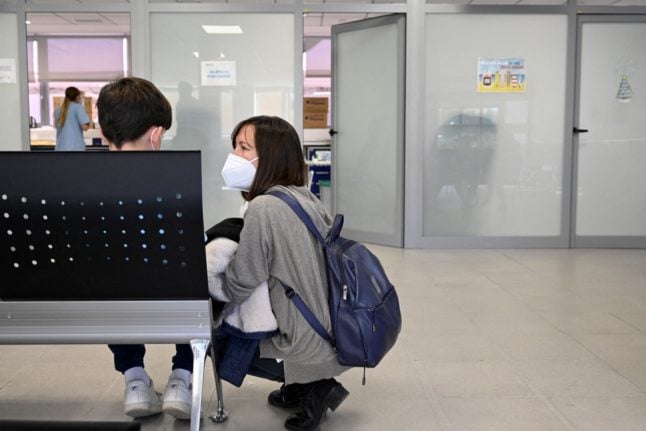It’s all felt a bit déjà vu in Spain in recent days. Respiratory infections on the up, worries about hospitals being overwhelmed, regional governments clashing with central government about the best way to approach things, and, of course, the return of face masks.
The Health Ministry, headed by Mónica García, called an extraordinary meeting of Spain’s Interterritorial Council of the National Health System (CISNS) in order to “unify the criteria” against the surge in respiratory illnesses over the winter, namely the ‘tripledemic’ threat of influenza, Covid-19 and bronchiolitis as it’s been dubbed in the Spanish and international press.
Although Spain’s Ministry of Health and regional governments failed to come to a nationwide agreement with regards to the mandatory use of masks in hospitals, health centres and pharmacies throughout the country, some regions have already made mascarillas mandatory.
Self-assessed health leave
The government is also considering the possibility of allowing three-day leave for people who have a mild illness that doesn’t require medical attention in order to ease pressure on the health system.
“We are studying self-justifying mild illnesses during the first three days,” García said in an interview with Onda Cero, indicating that this self-assessment process, referred to as ‘autobaja‘ in Spanish, would be for people that “do not need to go to the doctor.”
But what about masks? With no agreement between the government and regions yet, where do you need to wear one?
Mandatory masks
Valencia
The Valencian Ministry of Health has made masks mandatory in all health centres for symptomatic people when they are in shared spaces, including waiting rooms and consultations.
Catalonia
Masks are also mandatory in all health centres in Catalonia, though, as of Monday afternoon, it has not yet been confirmed if pharmacies are included.
Murcia
Murcia too has made face masks mandatory in hospitals and health centres and recommended their use in “in any space, when there are symptoms of respiratory disease.”
Health authorities in the southern region have been offering free masks since December 30th in hospitals.
Canary Islands
The mask mandate will enter into force tomorrow, Tuesday 9th, although like in Murcia their use has been recommended since December.
Aragón
In Aragón, masks are mandatory for all healthcare workers and personnel who work in health centres and hospitals, including social health centres. The mandate has also been extended to patients, but only those in waiting rooms.
Asturias
Face masks will be mandatory in Asturias from Tuesday 9th, in both hospitals and pharmacies.
Non-mandatory but recommended
The rest of the Spanish regions have yet to make masks mandatory in hospitals and health centres, but recommend their use, including:
Balearic Islands
The Balearic Government does however recommend using a mask if you have symptoms, as well as frequent hand washing and covering your mouth when sneezing.
Castilla and León
The Ministry of Health in Castilla y León has recommended masks for people who suspect that they may be ill or have a respiratory infection.
Basque Country
The Basque Department of Health also recommends masks for people with symptoms of respiratory illness, but has not made them obligatory.
Andalusia
The Andalusian Health Service (SAS) recommends masks for people with symptoms, previous health problems, when with vulnerable people or at hospitals or health centres, but has so far ruled out making them mandatory.
Madrid
The Madrid regional government has taken the most nakedly political approach and accused the Ministry of Health of a “lack of planning” and ruled out mask mandates.
Castilla-La Mancha
In Castilla La Mancha, mask use is recommended but not obligatory.
Cantabria
Similarly, in Cantabria masks are not mandatory but recommended.
Navarra
Navarra’s Ministry of Health claims that mask mandates in hospitals and health centres would require “a regulatory adjustment” that would have to be analysed “in depth.”
Masks are therefore recommended but not mandatory for now.
Galicia
In Galicia, masks are recommended in hospitals and other health centres but not mandatory.
La Rioja
Maks in hospitals are only recommended, not obligatory.
Extremadura
Masks are recommended but not mandatory.



 Please whitelist us to continue reading.
Please whitelist us to continue reading.
Member comments